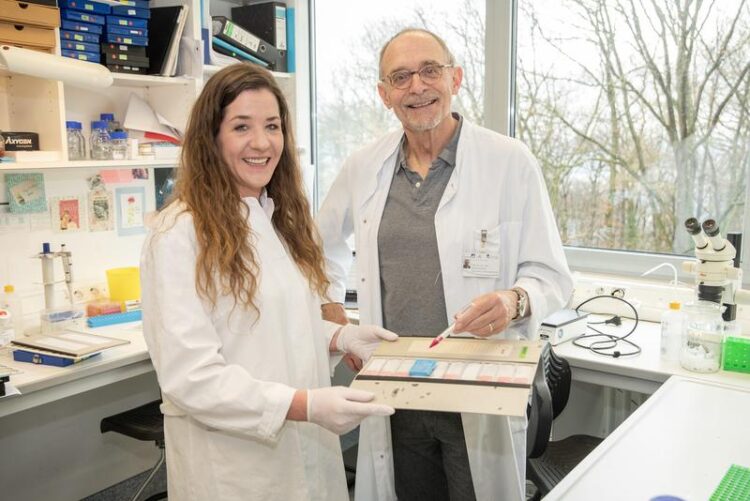Possible cause of male infertility

Possible cause of male infertility: Gina Esther Merges and Prof. Hubert Schorle study genes involved in sperm maturation.
(c) University Hospital Bonn (UKB) / Rolf Müller
Mature spermatozoa are characterized by an head, midpiece and a long tail for locomotion. Now, researchers from the University Hospital Bonn (UKB) and the Transdisciplinary Research Unit “Life & Health” at the University of Bonn have found that a loss of the structural protein ACTL7B blocks spermatogenesis in male mice. The cells can no longer develop their characteristic shape and remain in a rather round form. The animals are infertile. The results of the study have now been published in the scientific journal “Development”.
Bonn, 27. October – Mature spermatozoa are characterized by an head, midpiece and a long tail for locomotion. Now, researchers from the University Hospital Bonn (UKB) and the Transdisciplinary Research Unit “Life & Health” at the University of Bonn have found that a loss of the structural protein ACTL7B blocks spermatogenesis in male mice. The cells can no longer develop their characteristic shape and remain in a rather round form. The animals are infertile. The results of the study have now been published in the scientific journal “Development”.
Male sperm cells are constantly produced in large quantities in the testicles during so-called spermatogenesis. In this process, the typical elongated sperm cells are formed from round germ cells. This enormous change in shape requires the fine tuned reorganization of specialized structural proteins. One of these structural proteins is ACTL7B. “Since it is exclusively made in humans and mice during the maturation of male sperm, it has been postulated that the protein is important for this phase of development,” notes corresponding author Prof. Hubert Schorle from the Institute of Pathology at UKB, who is also a member of the Transdisciplinary Research Area (TRA) “Life & Health” at the University of Bonn.
To investigate the role of the structural protein in spermiogenesis, Prof. Schorle’s team generated a mouse model with a mutation in the Actl7b gene using gene-editing technology. This results in a complete loss of function of ACTL7B. “Without ACTL7B, development is blocked, the cells often remain in a roundish shape, usually do not form the elongated, typical sperm shape and die to a large extent ,” says first author Gina Esther Merges, a doctoral student in Professor Schorle’s laboratory.
Disruption in the network of proteins
In this context, the Bonn researchers found that ACTL7B is required for the reorganization of the cytoskeleton of spermatids. Using mass spectrometric analyses, they identified two interaction partners of ACTL7B, DYNLL1 and DYNLL2. “We were able to show that without the structural protein, DYNLL1 and 2 are not correctly localized in the round spermatids. Since it is probably a larger protein complex with further interaction partners, we attribute the above described effect to a loss of temporally and spatially precisely regulated and targeted redistribution of these proteins,” Prof. Schorle notes.
This explains why the sperm of male mice with a mutated Actl7b gene is not able to develop the characteristic shape. Due to this, the animals are infertile. In addition, according to other research, there is evidence that levels of the protein ACTL7B are reduced in some fertility patients. “Our study shows that mutations in the Actl7b gene could be the cause of male infertility,” says Prof. Schorle.
Publication:
Gina E. Merges, Lena Arévalo, Keerthika Lohanadan, Dirk G. de Rooij, Melanie Jokwitz, Walter Witke and Hubert Schorle; Development (2023) 150, dev201593;
DOI: https://doi.org/10.1242/dev.201593
Press contact:
Dr. Inka Väth
Deputy Press Officer at the University Hospital Bonn (UKB)
Communications and Media Office at Bonn University Hospital
Phone: (+49) 228 287-10596
About the University Hospital Bonn: The UKB cares for about 500,000 patients per year, employs about 9,000 people and has a balance sheet total of 1.6 billion euros. In addition to the more than 3,300 medical and dental students, another 585 people are trained in numerous health professions each year. The UKB is ranked first among university hospitals in North Rhine-Westphalia in the science ranking and in the Focus clinic list and has the third-highest case mix index (severity of cases) in Germany. The F.A.Z. Institute has named UKB the most sought-after employer and training champion among public hospitals in Germany in 2022 and 2023.
Wissenschaftliche Ansprechpartner:
Prof. Dr. rer.nat. Hubert Schorle
Institute of Pathology; Department of Developmental Pathology
University Hospital (UKB)
TRA “Life & Health”, University of Bonn
Phone: +49 228 287 16342
E-mail: schorle@uni-bonn.de
Originalpublikation:
Publication:
Gina E. Merges, Lena Arévalo, Keerthika Lohanadan, Dirk G. de Rooij, Melanie Jokwitz, Walter Witke and Hubert Schorle; Development (2023) 150, dev201593;
DOI: https://doi.org/10.1242/dev.201593
Media Contact
All latest news from the category: Health and Medicine
This subject area encompasses research and studies in the field of human medicine.
Among the wide-ranging list of topics covered here are anesthesiology, anatomy, surgery, human genetics, hygiene and environmental medicine, internal medicine, neurology, pharmacology, physiology, urology and dental medicine.
Newest articles

Innovative 3D printed scaffolds offer new hope for bone healing
Researchers at the Institute for Bioengineering of Catalonia have developed novel 3D printed PLA-CaP scaffolds that promote blood vessel formation, ensuring better healing and regeneration of bone tissue. Bone is…

The surprising role of gut infection in Alzheimer’s disease
ASU- and Banner Alzheimer’s Institute-led study implicates link between a common virus and the disease, which travels from the gut to the brain and may be a target for antiviral…

Molecular gardening: New enzymes discovered for protein modification pruning
How deubiquitinases USP53 and USP54 cleave long polyubiquitin chains and how the former is linked to liver disease in children. Deubiquitinases (DUBs) are enzymes used by cells to trim protein…



